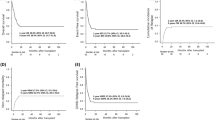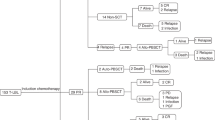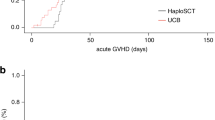Abstract
Rescue chemotherapy or autologous stem cell transplantation (autoSCT) gives disappointing results in relapsed peripheral T-cell lymphomas (PTCLs). We have retrospectively evaluated the long-term outcome of 52 patients receiving allogeneic SCT for relapsed disease. Histologies were PTCL-not-otherwise specified (n=23), anaplastic large-cell lymphoma (n=11), angioimmunoblastic T-cell lymphomas (n=9) and rare subtypes (n=9). Patients were allografted from related siblings (n=33, 64%) or alternative donors (n=13 (25%) from unrelated and 6 (11%) from haploidentical family donors), following reduced-intensity conditioning (RIC) regimens including thiotepa, fludarabine and cyclophosphamide. Most of the patients had chemosensitive disease (n=39, 75%) and 27 (52%) failed a previous autoSCT. At a median follow-up of 67 months, 27 of 52 patients were found to be alive (52%) and 25 (48%) were dead (n=19 disease progression, n=6 non-relapse mortality (NRM)). The cumulative incidence (CI) of NRM was 12% at 5 years. Extensive chronic graft-versus-host disease increased the risk of NRM (33% versus 8%, P=0.04). The CI of relapse was 49% at 5 years, influenced by disease status at the time of allografting (P=0.0009) and treatment lines (P=0.007). Five-year overall survival and progression-free survival (PFS) were 50% (95% CI, 36 – 63%) and 40% (95% CI, 27 – 53%), respectively. The current PFS was 44% (95% CI, 30–57%). In all, 8 out of 12 patients (66%) who received donor-lymphocytes infusions for disease progression had a response. At multivariable analysis, refractory disease and age over 45 years were independent adverse prognostic factors. RIC allogeneic SCT is an effective salvage treatment with a better outcome for younger patients with chemosensitive disease.
This is a preview of subscription content, access via your institution
Access options


Similar content being viewed by others
References
Vose J, Armitage J, Weisenburger D . International peripheral T-cell and natural killer/T-cell lymphoma study: pathology findings and clinical outcomes. J Clin Oncol 2008; 26: 4124–4130.
Mercadal S, Briones J, Xicoy B, Pedro C, Escoda L, Estany C et al. Grup per l′Estudi dels Limfomes de Catalunya I Balears (GELCAB). Intensive chemotherapy (high-dose CHOP/ESHAP regimen) followed by autologous stem-cell transplantation in previously untreated patients with peripheral T-cell lymphoma. Ann Oncol 2008; 19: 958–963.
Reimer P, Rüdiger T, Geissinger E, Weissinger F, Nerl C, Schmitz N et al. Autologous stem-cell transplantation as first-line therapy in peripheral T-cell lymphomas: results of a prospective multicenter study. J Clin Oncol 2009; 27: 106–113.
Corradini P, Tarella C, Zallio F, Dodero A, Zanni M, Valagussa P et al. Long-term follow-up of patients with peripheral T-cell lymphomas treated up-front with high-dose chemotherapy followed by autologous stem cell transplantation. Leukemia 2006; 20: 1533–1538.
Rodríguez J, Conde E, Gutiérrez A, Lahuerta JJ, Arranz R, Sureda A et al. Grupo Español de Linfomas/Trasplante Autólogo de Médula Osea, Spanish Lymphoma/Autologous Bone Marrow Transplant Study Group. The adjusted International Prognostic Index and beta-2-microglobulin predict the outcome after autologous stem cell transplantation in relapsing/refractory peripheral T-cell lymphoma. Haematologica 2007; 92: 1067–1074.
Chen AI, McMillan A, Negrin RS, Horning SJ, Laport GG . Long-term results of autologous hematopoietic cell transplantation for peripheral T cell lymphoma: the Stanford experience. Biol Blood Marrow Transplant 2008; 14: 741–747.
Kim SW, Tanimoto TE, Hirabayashi N, Goto S, Kami M, Yoshioka S et al. Myeloablative allogeneic hematopoietic stem cell transplantation for non-Hodgkin lymphoma: a nationwide survey in Japan. Blood 2006; 108: 382–389.
Le Gouill S, Milpied N, Buzyn A, Peffault De Latour R, Vernant JP, Mothy M et al. Graft-versus-Lymphoma effect for aggressive T-cell lymphomas in adults: a study by the Société Francaise de Greffe de Moëlle et de Thérapie Cellulaire. J Clin Oncol 2008; 26: 2264–2271.
Corradini P, Dodero A, Zallio F, Caracciolo D, Casini M, Bregni M et al. Graft-versus-lymphoma effect in relapsed peripheral T-cell non-Hodgkin’s lymphomas after reduced-intensity conditioning followed by allogeneic transplantation of hematopoietic cells. J Clin Oncol 2004; 22: 2172–2176.
Lamparelli T, van Lint MT, Gualandi F, Raiola AM, Barbanti M, Sacchi N et al. Alternative donor transplants for patients with advanced hematologic malignancies, conditioned with thiotepa, cyclophosphamide and antithymocyte globulin. Bone Marrow Transplant 2000; 26: 1305–1311.
Dodero A, Carniti C, Raganato A, Vendramin A, Farina L, Spina F et al. Haploidentical stem cell transplantation after a reduced-intensity conditioning regimen for the treatment of advanced hematologic malignancies: post-transplantation CD8-depleted donor lymphocyte infusions contribute to improve T-cell recovery. Blood 2009; 113: 4771–4779.
Cheson BD, Horning SJ, Coiffier B, Shipp MA, Fisher RI, Connors JM et al. Report of an International Workshop to standardize response criteria for non-Hodgkin's lymphomas. J Clin Oncol 1999; 17: 1244–1253.
Przepiorka D, Weisdorf D, Martin P, Klingemann HG, Beatty P, Hows J et al. 1994 Consensus Conference on acute GVHD grading. Bone Marrow Transplant 1995; 15: 825–828.
Klein JP, Rizzo JD, Zhang MJ, Keiding N . Statistical methods for the analysis and presentation of the results of bone marrow transplants. Part 2: Regression modeling. Bone Marrow Transplant 2001; 28: 1001–1011.
Gray RJ . A class of k-sample tests for comparing the cumulative incidence of a competing risk. Ann Stat 1988; 16: 1141–1154.
Deeg HJ, Sandmaier BM . Who is fit for allogeneic transplantation? Blood 2010; 116: 4762–4770.
Gooley TA, Chien JW, Pergam SA, Hingorani S, Sorror ML, Boeckh M et al. Reduced mortality after allogeneic hematopoietic-cell transplantation. N Engl J Med 2010; 363: 2091–2101.
Dreger P, Brand R, Milligan D, Corradini P, Finke J, Lambertenghi Deliliers G et al. Reduced-intensity conditioning lowers treatment-related mortality of allogeneic stem cell transplantation for chronic lymphocytic leukemia: a population-matched analysis. Leukemia 2005; 19: 1029–1033.
Sureda A, Robinson S, Canals C, Carella AM, Boogaerts MA, Caballero D et al. Reduced-intensity conditioning compared with conventional allogeneic stem-cell transplantation in relapsed or refractory Hodgkin's lymphoma: an analysis from the Lymphoma Working Party of the European Group for Blood and Marrow Transplantation. J Clin Oncol 2008; 26: 455–462.
Michallet M, Sobh M, Milligan D, Morisset S, Niederwieser D, Koza V et al. Chronic Leukemia Working Party of the EBMT. The impact of HLA matching on long-term transplant outcome after allogeneic hematopoietic stem cell transplantation for CLL: a retrospective study from the EBMT registry. Leukemia 2010; 24: 1725–1731.
Farina L, Bruno B, Patriarca F, Spina F, Sorasio R, Morelli M et al. The hematopoietic cell transplantation comorbidity index (HCT-CI) predicts clinical outcomes in lymphoma and myeloma patients after reduced-intensity or non-myeloablative allogeneic stem cell transplantation. Leukemia 2009; 23: 1131–1138.
Shustov AR, Gooley TA, Sandmaier BM, Shizuru J, Sorror ML, Sahebi F et al. Allogeneic haematopoietic cell transplantation after nonmyeloablative conditioning in patients with T-cell and natural killer-cell lymphomas. Br J Haematol 2010; 150: 170–178.
Jacobsen ED, Kim HT, Ho VT, Cutler CS, Koreth J, Fisher DC et al. A large single-center experience with allogeneic stem-cell transplantation for peripheral T-cell non-Hodgkin lymphoma and advanced mycosis fungoides/Sezary syndrome. Ann Oncol 2011; 22: 1608–1613.
Kyriakou C, Canals C, Finke J, Kobbe G, Harousseau JL, Kolb HJ et al. Allogeneic stem cell transplantation is able to induce long term remissions in Angioimmunoblastic T-cell Lymphoma: a retrospective study from the Lymphoma Working party of EBMT. J Clin Oncol 2009; 27: 3951–3958.
Acknowledgements
This study was supported in part by grants from Associazione Italiana Ricerca sul Cancro (AIRC) and MIUR.
Author information
Authors and Affiliations
Corresponding author
Ethics declarations
Competing interests
The authors declare no conflict of interest.
Additional information
Supplementary Information accompanies the paper on the Leukemia website
Supplementary information
Rights and permissions
About this article
Cite this article
Dodero, A., Spina, F., Narni, F. et al. Allogeneic transplantation following a reduced-intensity conditioning regimen in relapsed/refractory peripheral T-cell lymphomas: long-term remissions and response to donor lymphocyte infusions support the role of a graft-versus-lymphoma effect. Leukemia 26, 520–526 (2012). https://doi.org/10.1038/leu.2011.240
Received:
Revised:
Accepted:
Published:
Issue date:
DOI: https://doi.org/10.1038/leu.2011.240
Keywords
This article is cited by
-
Real-world data of long-term survival in patients with T-cell lymphoma who underwent stem cell transplantation
Blood Cancer Journal (2023)
-
Romidepsin-CHOEP followed by high-dose chemotherapy and stem-cell transplantation in untreated Peripheral T-Cell Lymphoma: results of the PTCL13 phase Ib/II study
Leukemia (2023)
-
Autologous or allogeneic hematopoietic cell transplantation for relapsed or refractory PTCL-NOS or AITL
Leukemia (2022)
-
Management of Peripheral T-cell Lymphomas and the Role of Transplant
Current Oncology Reports (2022)
-
The impact of allogeneic hematopoietic cell transplantation on the mortality of poor-risk non-Hodgkin lymphoma: an intent-to-transplant analysis
Bone Marrow Transplantation (2021)



